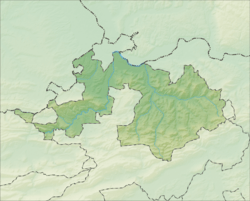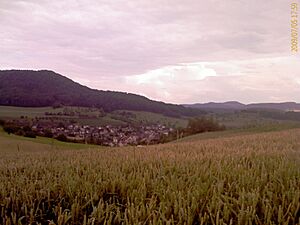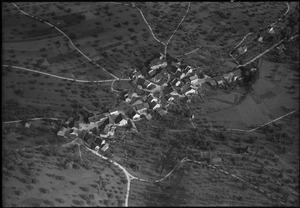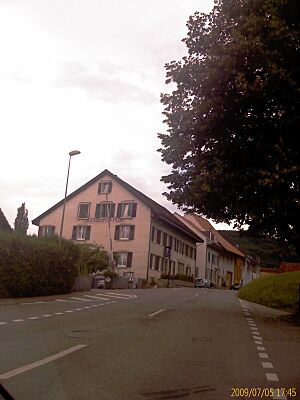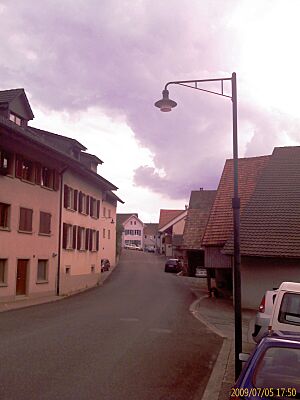Rickenbach, Basel-Landschaft facts for kids
Quick facts for kids
Rickenbach
|
||
|---|---|---|
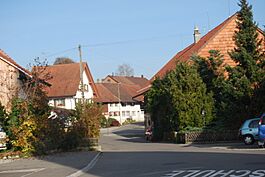 |
||
|
||
| Country | Switzerland | |
| Canton | Basel-Landschaft | |
| District | Sissach | |
| Area | ||
| • Total | 2.9 km2 (1.1 sq mi) | |
| Elevation | 479 m (1,572 ft) | |
| Population
(Jun 2021 )
|
||
| • Total | 612 | |
| • Density | 211/km2 (547/sq mi) | |
| Postal code |
4462
|
|
| Surrounded by | Böckten, Buus, Gelterkinden, Ormalingen, Sissach, Wintersingen | |
Rickenbach is a small town, also called a municipality, located in Switzerland. It's part of the Basel-Country area, which is one of Switzerland's cantons (like a state or region). Rickenbach is found in the Sissach district.
Contents
A Look at Rickenbach's Past
Rickenbach has a long history! The town was first mentioned in official records way back in 1274. Back then, its name was spelled Richenbah.
Exploring Rickenbach's Geography
Rickenbach covers an area of about 2.89 square kilometers (which is about 1.12 square miles). A big part of this land, about 56%, is used for farming. Forests cover another 33% of the area. The rest, about 11%, is where buildings and roads are.
The town is nestled in a side valley that branches off from the Ergolz valley. This makes for some beautiful scenery!
Rickenbach's Coat of Arms
Every town has a special symbol, and Rickenbach's is its coat of arms. It shows a wavy silver bar across a shield that is half red and half blue. This design is called Per fess Gules and Azure, overall a Bar wavy Argent.
Who Lives in Rickenbach?
Rickenbach has a population of about 553 people (as of 2022). Most people in Rickenbach speak German, which is the main language for about 93% of the residents. A small number of people also speak Indo-Aryan languages or French.
In 2008, about 50.5% of the people living in Rickenbach were male and 49.5% were female. Most of the residents, about 92%, are Swiss citizens.
The age groups in Rickenbach (as of 2010) show that about 7% of the population are young children (0-6 years old). Teenagers (7-19 years old) make up about 14.5% of the population.
Homes and Households
In 2000, there were 198 households in Rickenbach, with an average of 2.6 people living in each home. About 21.6% of these households were made up of just one person. Many homes were for married couples, some with children and some without.
Most of the buildings in Rickenbach are single-family homes. In 2000, there were 97 such homes. Many of these were built between 1981 and 1990.
The town had 219 apartments in 2000. Most of these apartments, about 86%, were lived in all the time.
Population Changes Over Time
The number of people living in Rickenbach has changed over the years. You can see how the population has grown and shrunk in the chart below:

Rickenbach's Economy and Jobs
In 2007, the unemployment rate in Rickenbach was quite low, at 1.45%. This means most people who wanted jobs had them.
Types of Jobs
The economy of Rickenbach involves different types of jobs:
- Primary Sector: This includes jobs related to farming and forestry. In 2005, about 52 people worked in this area.
- Secondary Sector: These jobs involve making things, like in factories or construction. About 9 people worked in this sector.
- Tertiary Sector: This covers jobs that provide services, like working in hotels, restaurants, or education. About 12 people worked in this sector.
In 2008, there were 47 full-time jobs in Rickenbach. Most of these were in agriculture.
Commuting to Work
Many people who live in Rickenbach travel to other towns for work. In 2000, 235 people commuted out of Rickenbach, while only 11 commuted in. This means Rickenbach is a place where people live and then travel to other areas for their jobs. About 21% of workers used public transportation, and over 51% used a private car.
Religion in Rickenbach
In 2000, most people in Rickenbach, about 63.7%, belonged to the Swiss Reformed Church. About 14% were Roman Catholic. There were also smaller groups of people who were Islamic, Buddhist, or Hindu. Some people also chose not to be part of any church.
Education in Rickenbach
Education is important in Rickenbach. About 41% of the population has finished high school (called upper secondary education in Switzerland). Also, about 9.8% have gone on to get higher education from a university or a specialized college.
In 2000, 80 students from Rickenbach attended schools outside of the municipality. This shows that students travel to other places for their schooling.
See also
 In Spanish: Rickenbach (Basilea) para niños
In Spanish: Rickenbach (Basilea) para niños




